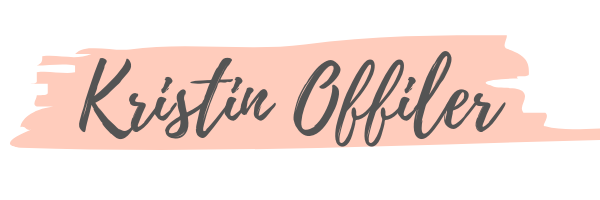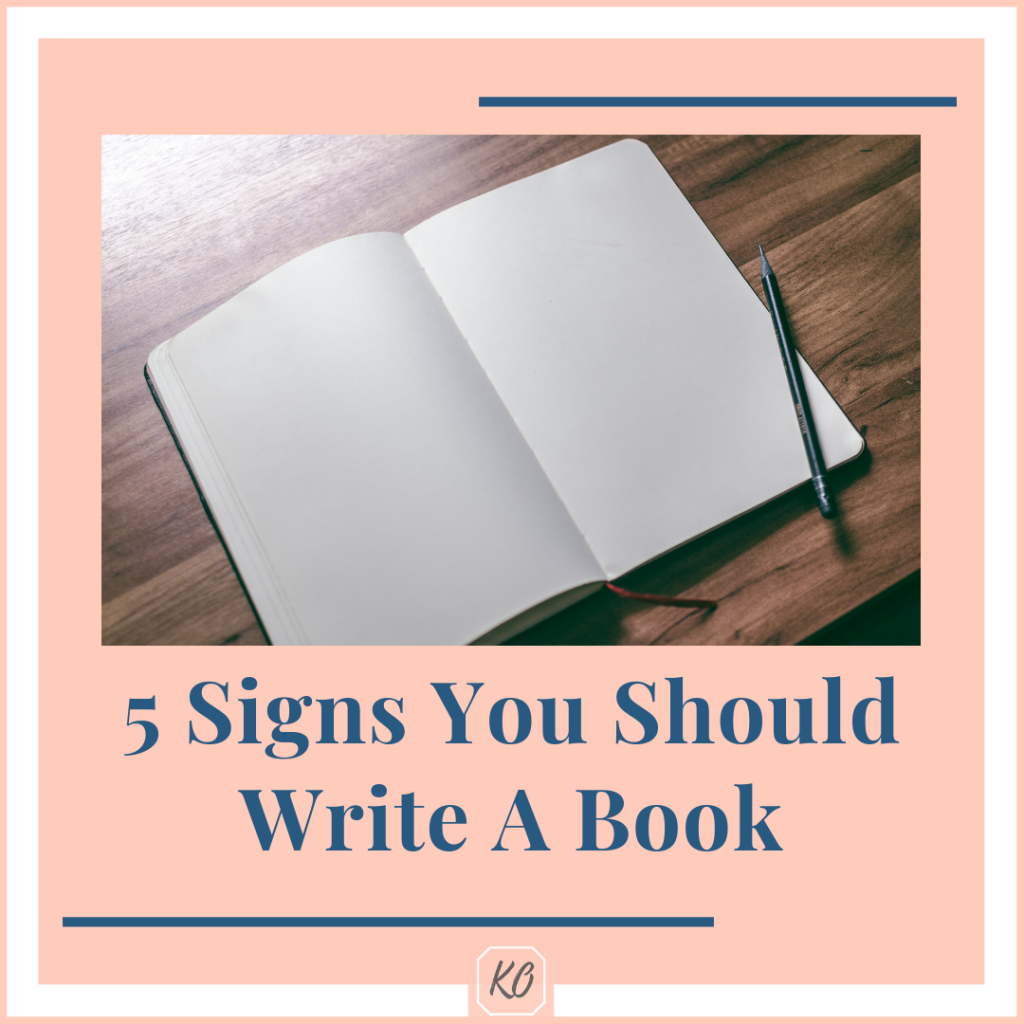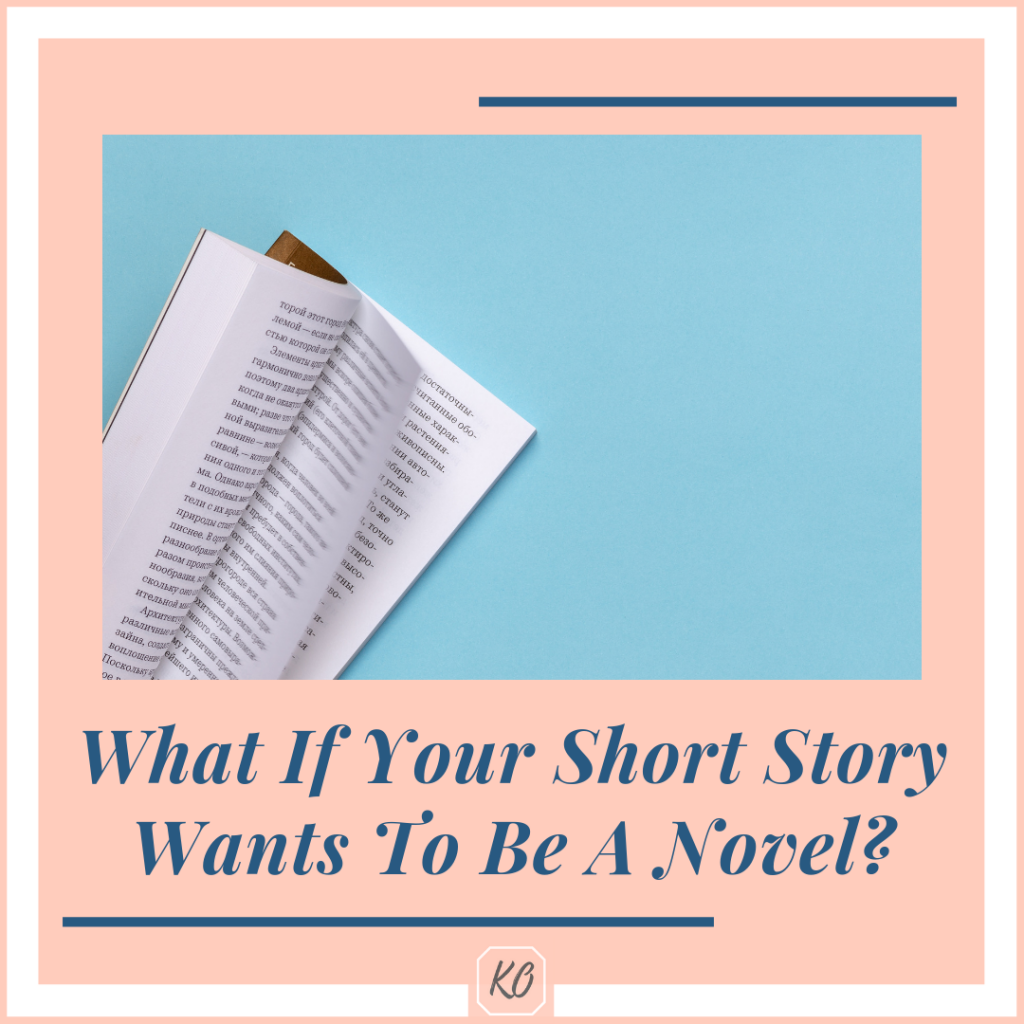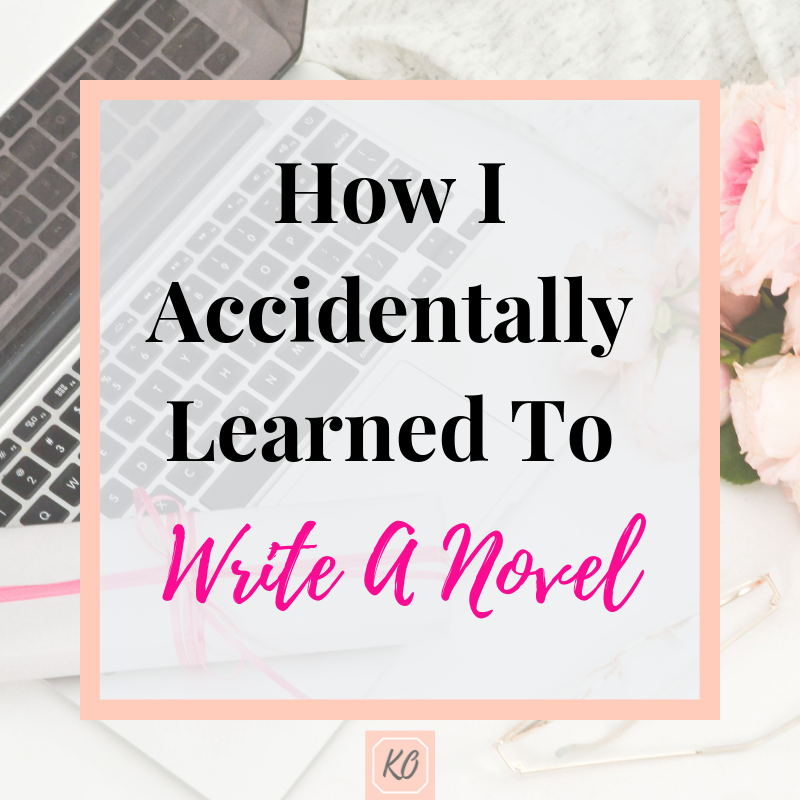I wrote my first novel accidentally.
Well, I started writing it accidentally. I hadn’t set out to pen an entire 95,000 word novel, yet that’s what happened.
My second novel was one hundred percent intentional. I knew I was going to write another book and I had a pretty good idea what I was doing when I got started.
In both cases, there were some strong signs that told me I needed to write a book.
Of course, it’s not a scientific process that can be determined with a little check-list, but here are five pretty solid signs that you should write a book.
1. You Can’t Stop Thinking About A Story/Image/Character
With my first novel, I couldn’t shake this one particular image that I wrote during a writing exercise. I kept seeing it in my mind for days after I first wrote those couple of sentences.
I not only kept thinking about it, but I was desperately curious to know more. Who were those people I’d envisioned? What were they doing?
I just kept freewriting until more information revealed itself. It didn’t feel like I was making it up, but rather that I was discovering it.
When I wrote my second novel, I couldn’t shake the image of four adult women who had been friends since they were teenagers together on Block Island. I kept thinking about their dynamic, their bond, their issues with each other. Again, I was so curious to know more that I just started to write and let the story reveal itself through the process.
If there’s something you can’t stop thinking about, whether it’s a scene you’ve already written, a line of dialogue, a character, a specific image, a concept… try writing on that specific thing every day for a couple of weeks and see what comes up.
In my case, I thought I was writing a short story with my first novel, but I soon realized there was too much story there to contain it in a few thousand words.
With that said, the next sign you should write a book is…
2. You Tried Making It A Short Story, But Couldn’t Cut The Length
If I try writing something as a short story and I can feel there are many thousands of words more to put down, I commit to making the piece longer.
How can you tell, though?
As someone who’s written both short stories and novels, I can say it’s not always a cut-and-dry answer. Sometimes you can just get a sense that the story you’re trying to tell in twenty pages needs two-hundred to actually work.
Other times, you might think you’re writing a novel and realize at the end of the first chapter that you’re trying to draw out something that’s much more contained.
A good way to test if a piece should be book-length is to write scenes consistently for a few weeks and see if you’re still feeling energy from the story. In both of my novels, I kept feeling like I was being pulled forward to new scenes every time I saw down to write.
But if I had started to feel like I was simply out of energy and scenes, I would’ve regrouped and let it be a short story.
3. You’re Terrified Of The Process, But So Eager To Try It
So many writers say they have a book in them, but so many writers never give it a try. If you’re terrified of the process, that’s valid.
It’s scary to try something new that could take up years of your life and which has no guarantee of success.
Why do any of us write books in that case?!
Well, it’s because we’re eager to try it. It may be scary, but it’s also exciting. No one really knows what they’re doing when it comes to writing a book, but the act of trying something new that you’re genuinely eager to try… that’s worth it.
4. You Read A Lot And Always Think, “I Could Do That”
Do you find yourself thinking, I could totally do this when you finish a book?
If you’re an avid reader, chances are you can write a book. The more you read, the more you intrinsically understand what makes a good story.
Beyond this, though, if you feel a creeping sense of envy about other people publishing books, you’re probably ready to try writing one of your own. Not only do you know that you could do it, but you have a desire for what another writer has accomplished. If that’s the case, that’s a pretty strong signal.
5. You Keep Thinking About Writing A Book
Sorry to state the obvious, but if you’ve been thinking about writing a book, you should probably just try writing a book.
I think some people stop themselves from trying because of any number of excuses:
- I’m not ready
- No one wants to hear what I have to say
- The story I want to write isn’t interesting enough
- I’m not a good enough writer
- I’ve never written anything before
- I’ll probably fail at this like I fail at everything else
- I’m too embarrassed to admit I want to write a book
- I have no idea how to write a book
- I don’t have time to write a book
- I need to make an outline first, but I don’t know what I’d even put on it
Etc, etc, etc.
You need to let this truth settle into your bones.
You can start writing a book today with zero planning and zero prior experience writing a book. All you need to do is start.
No one has to see what you’re writing until you’re ready to share it. You can edit everything later on. There’s no one waiting for you to finish by a certain deadline.
Truly, the only thing stopping you is you. If you want to write a book… why not give it a try?
Tell me, do you want to write a book? What’s stopping you?
Once upon a time, I was a short story writer who dreamed of one day writing a novel.
During my MFA program, I wrote many short stories. That was my area of focus and I felt like I had a good handle on the form.
I occasionally dabbled in writing novels, particularly during National Novel Writing Month, but couldn’t get any of my novels off the ground and assumed I was better suited to short pieces that could be contained more easily.
For a long time, I was strictly a short story-ist.
Then, in 2014, my autoimmune disease flared up so badly that I could barely walk, eat, or function. I lived in a constant state of fatigue. I’d work my remote job all day (thank goodness I didn’t have a commute), and then have just enough energy to fall asleep by 7 pm.
In short, I wasn’t writing.
When things started to level off and I felt better, my husband and I went on a trip to Bermuda. It was exactly what my spirit needed to recharge after months of feeling horrible.
We came home from Bermuda and I was ready to channel some of my energy into writing again. I was desperate, actually. So I started scribbling out ideas for short stories set in Bermuda since the island had fully captivated me.
Everything I wrote felt like cardboard: flimsy and bland and not at all what I was trying to say.
I had a feeling I needed to spend some time warming up before I tried writing anything concrete. So I set out to write for 100 days straight and worked through my favorite writing program, The Story Course, while doing so.
Eventually, I did an exercise that triggered a scene that I couldn’t shake from my mind. Each time I went to my notebook after that, I wrote more about it.
This went on for a month when I realized the short story I thought I was writing was actually something much bigger.
The problem was, I’d never had any luck with writing a novel before. All of my NaNoWriMo novels had been terrible and my focus in grad school had been short fiction.
I had no clue how to write a novel, especially when I’d done zero preparation!
But honestly, I didn’t have time to stop and doubt it very much. The scenes were coming to me as if channeled. I was writing for 100 consecutive days and truly didn’t have a chance to second guess what I was doing.
I just… wrote.
It sounds too obvious and wildly unhelpful, but hear me out. I think this is a great approach to writing a novel.
I’d tried writing many books before this one and with those, I’d done research and created outlines. And they still failed.
This time, it was as if the idea had been a passing train that I happened to see and jump onto just in time. If I’d been looking the other way, the train would’ve passed by and found another passenger.
I had no idea where it was going, but I was riding the train to the end of the line even though I hadn’t expected to write such a long story.
The magic formula of writing that novel was:
- Being committed to writing consistently. This allowed the idea to show up and grab my attention.
- Writing without judgment or expectation. Instead of asking myself what I was doing, questioning if it was a good idea, or stopping myself for some silly reason (like not knowing enough information about the time period, not being prepared enough with an outline, not knowing the ending, etc), I just wrote.
- Staying open to write what I felt excited to write. Rather than follow an outline, I let the story dictate what I wrote next. I let myself enjoy the process and just put words on the page. I knew I could fix it later as long as I wrote what most intrigued me in the moment.
So what can you do if you’re writing a short piece that wants to be a novel?
Trust your instinct that it should be a long piece
If you have the sense that there’s more story to tell than you want to put in a short story, believe that instinct. You can always cut it back later.
I personally think it’s better to explore a story to its fullest potential instead of deciding initially that a story won’t work a certain way. You never know what’ll be revealed as you write.
Resist the urge to control the process
The biggest mistake I made when writing this novel was trying to wrangle the process about a month into writing.
Once I realized I was writing something longer than a short story, I thought I needed to create an outline and pack the story into a neat box.
As soon as I started outlining, I felt a physical sensation of resistance. It was a contracting, shrinking feeling of dread. I knew outlining would be a feeble attempt at controlling something that I didn’t need to control.
So I tossed the outline and kept writing what interested me. The story revealed itself the more I wrote, and while I did have to do a lot of organizing later to put it all in order, I fully enjoyed the process.
And, amazingly, the one time I didn’t try to control my writing with an outline turned out to be the one time I completed a novel and didn’t hate it by the end!
Read novels carefully and study what makes them work
You can take classes (I’m a big fan of always learning) about certain aspects of writing, but sometimes the best way to learn is to study the form itself.
Read all the novels you can get your hands on and pay close attention to what the writer is doing and how they achieve it.
What do you like the most about your favorite novels? Why do you love them? What is it about the structure, the story itself, the character development that resonates with you?
I also highly recommend the book The Plot Whisperer by Martha Alderson to everyone writing a novel. Even if you’re not writing a novel, it’s still a great read.
The reason I recommend it is because Alderson shows you exactly how a story works. She goes into great depth about character development and how that development happens through story arc.
Once I read this book and underlined almost every single page, something clicked for me that hadn’t clicked before. Story shape made much more sense.
And, honestly, the next novel I wrote was a much more organized process because I had a clear sense of my story’s shape and progress thanks to The Plot Whisperer.
Just keep writing
This is the best advice I can give you when a short piece starts to feel like it should be a long piece. Just keep writing. As long as you have a thread to pull, keep pulling.
Don’t force it for the sake of making the story a novel, but if you have a spark of excitement about what you’re writing, follow that with as much judgment-free curiosity as possible.
You may not know what you’re really creating until you’ve put it all on the page, so don’t stop writing too soon.
Have you ever started writing something only to realize it was meant to be a longer piece than you expected? What did you do?
By the time I realized I was writing a novel, it was too late to turn back.
I’d already been writing for a month or so on an image that came to me while doing a writing exercise. The image was of two people standing together in a patch of wild fennel.
Initially, I was just writing whatever came up. I didn’t judge, assess, or expect what I was writing to become anything in particular.
I was just freewriting about something that made me curious and enjoying the process.
Soon, I started writing feverishly, like I was downloading information from somewhere and transcribing a story that already existed.
I wrote thousands of words and dozens of scenes when I realized there was actually quite a bit of story to tell.
My initial reaction was to figure out a way to shorten the story so it wouldn’t be too long, yet I also didn’t want to force it into the space of a shorter piece when it clearly was a novel.
But at the same time, I had absolutely no idea what I was doing when it came to writing a novel.
I hadn’t planned ahead, I hadn’t done any research, I hadn’t plotted out the story at all or developed any of the characters or given a single second of thought to the magnitude of writing a whole entire novel.
You have to understand, I’m a planner! I like to be prepared. But this story came out of left field, and before I could really grasp what was happening, I was writing a novel.
So… I rolled with it and wrote a novel. And honestly, that was the best thing that could’ve happened.
Here are my key takeaways from accidentally learning to write a novel so you can implement them, too.
There’s A Time And Place For Planning
And I happen to think it comes after your first draft is complete.
I know some people disagree with this and won’t start a project unless it’s thoroughly researched and outlined first. If that’s your jam, you do you, boo.
I’m not here to tell you to fix what isn’t broken.
But if you’re working on your first book and planning ahead is stifling your creativity, remember that your first draft is where you’re learning the story and figuring everything out.
If you want to throw your outline in the trash and wing it for draft #1, DO IT.
Planning ahead is not always the best way to write a book. Sometimes you have to let your writer instincts run the show, especially with a new story.
You Can Revise EVERYTHING Later
This is now one of my writing mantras, but I didn’t come to fully understand it until I was writing a novel and had no idea if I was doing anything right.
Not only is this true, but it’s also a way to let go of perfectionism and just write.
So many people get caught up worrying if they’re doing it right (hello!) or just making a mess. You know what? You can’t really assess that until you’re done writing.
And then once you have a completed draft in front of you, you can revise everything.
I love reminding myself that I can fix anything in revision, too. Plot holes will get patched up later, characters will be fleshed out more thoroughly, typos will be corrected.
There’s no reason to get hung up on getting it “right” on your first pass of a story. Just get it written and deal with the piece as a whole later when you revise.
Don’t Think Big Picture Too Much
When you think big picture while writing a novel (or any large project), you’re bound to get overwhelmed by how much goes into it.
I only think “big picture” with my projects in terms of story arc and hitting certain emotional markers.
Otherwise, my focus is always on writing one scene at a time.
A novel is just a series of scenes tacked together, after all.
So focus on one at a time and make it as strong as possible while you’re focusing on it. Then, move on to the next scene. And the next.
You can worry later about the order of your scenes or if each one works. But when you’re writing, think as small-scale as possible.
Stay on the ground, rooted in the action of each scene rather than going aerial and trying to make sense of the whole landscape before the story is complete.
You’ll know when it’s time to take a step back and look at your story from a wider perspective. Until then, don’t worry about it. Just focus on the individual pieces that will form the larger story.
It’s OK To Not Know What You’re Doing
I own a lot of books on writing. I have an MFA and I’ve taken a good amount of writing courses separate from my academic experience.
And you know what? I still don’t know what I’m doing. I have a feeling you don’t, either.
There’s nothing wrong with that because honestly? That’s just pretty much how writing goes.
You can study the craft and read obsessively and dedicate yourself to becoming as good a writer as possible, and still have no idea what you’re doing.
So when you undertake writing a novel, know that it’s ok if you feel completely lost most of the time.
You can learn anything craft-wise that you need to learn while you’re writing, but you can’t fully know your project until it’s done.
So keep writing even when you feel overwhelmed by uncertainty. If you think you don’t know what you’re doing, that means you’re doing just fine.



